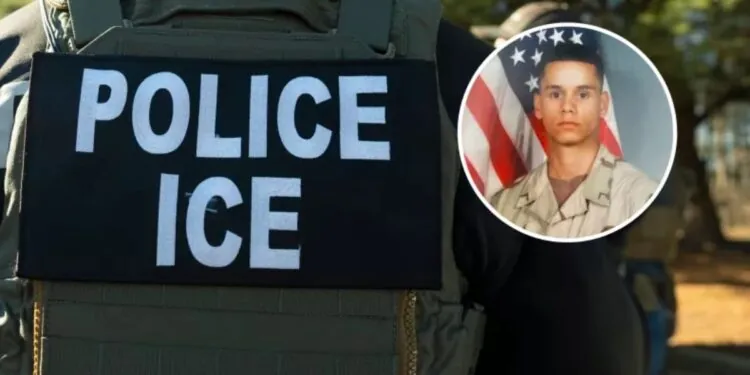Jose Barco, a U.S. Army veteran awarded a Purple Heart for his service in Iraq, is currently being held in a Texas detention center awaiting deportation after having lived in the United States for 35 years.
Barco, who is not a US citizen but has served in the military, has a criminal record and recently completed a 15-year prison sentence the day after President Donald Trump’s inauguration.
U.S. immigration officials recently attempted to deport him, but he was denied by Venezuelan authorities and is now “virtually stateless at this time, with his country of birth rejecting his admission and the country he shed blood for ordering him removed,” according to Anna Stout, former mayor of Grand Junction, Colorado, who is assisting the Barco family.
Why It Matters
This Article Includes [hide]
Trump campaigned on a strong immigration policy, promising to carry out the greatest mass deportation in US history. During the first months of his presidency, his administration deported approximately 100,000 illegal immigrants.
Although the administration claims to prioritize individuals with criminal records or gang links, some legal residents and non-criminal immigrants have been detained and deported.
Veterans have expressed dissatisfaction with Trump after hundreds of former service members were sacked from their Department of Veterans Affairs (VA) positions as part of Trump’s drive to decrease government bloat and waste. Veterans account for over 30% of the federal workforce, with the VA being the single largest employer of veterans in the civil service.
Non-citizens who serve in the military may qualify for expedited naturalization provided they complete all of the requirements, including serving “honorably” during a “designated period of hostilities.”
Veterans and military people frequently suffer from mental illnesses. According to a 2017 Rand Corporation analysis, 13 to 20 percent of the 2.8 million service members deployed in Iraq and Afghanistan suffer from posttraumatic stress disorder (PTSD), 19 to 23 percent have a traumatic brain injury (TBI), and 44 percent struggle to adjust to civilian life.
Who Is Jose Barco?
Barco, 39, was born in Venezuela to a father who escaped Cuba upon his release as a political prisoner. He moved to the United States when he was four years old and is now married to Tia Barco, a US citizen, and the father of a 15-year-old daughter. Tia told Newsweek in an email on Sunday that he has never met his daughter outside of prison, but the couple “had hoped” for it.
She further stated that, although being married for 15 years, he had not sought a green card through marriage “due to his conviction.”
Barco joined the United States military at a young age and was initially sent to western Iraq in 2004. He witnessed severe warfare with insurgent factions and suffered numerous major injuries from bombs and crashes. He was eventually diagnosed with a traumatic brain injury, according to NPR.
He returned to Iraq in 2006, and according to reports, one of his commanding commanders, Lieutenant Colonel Michael “Hutch” Hutchinson, assisted him in filling out the procedures to become a naturalized citizen.
In a memo to immigration officials in February 2025, Hutchinson stated, “I definitely remember Jose Barco completing and submitting his application for United States citizenship… According to NPR, the packet was lost at some point, and no chain of custody documents could be found.
Barco was honorably dismissed from the service in 2008, aged 23, due to severe TBI symptoms. He served with Charlie Company, 1st Battalion, 506th Infantry Regiment, which was later featured in a PBS Frontline series on military violence, long-term trauma, drug usage, and post-war depression. He was previously stationed at Fort Carson.
According to the Colorado Springs Gazette, on April 25, 2008, Barco opened fire on a house party crowd in Colorado Springs, injuring a 19-year-old woman who was five months pregnant at the time. He was found guilty of two charges of attempted first-degree murder and one count of felony menacing and sentenced to 52 years in prison. His sentence was later reduced to forty years in 2014.
Tia told Newsweek that Barco served 15 years in prison in Colorado. She stated that he first served at Buena Vista Correctional Complex and then spent the last five years in “an incentive program at CSP Colorado State Prison [Penitentiary].”
He was freed on parole on January 21, 2025, and was “immediately detained,” according to his wife, who told Newsweek.
What To Know About His Detention and Deportation
In March, Trump invoked the Alien Enemies Act of 1798, an old wartime law that gave the president broad powers. Since then, hundreds of Venezuelans, including many alleged gang members, have been bundled into flights and deported, with many landing up in a renowned prison in El Salvador.
Following his release from prison on January 21, Barco was reportedly seized by ICE and sent to a Colorado detention center before being transferred to two other centers in Texas. Newsweek learned from Stout and Tia that the El Valle Detention Center in Raymondville, Texas, is currently housing him. Newsweek couldn’t find him in the ICE detention database.
Barco reportedly underwent a deportation to Venezuela via Honduras in late March, only to have his journey halted and returned to Texas. Stout verified to Newsweek that “he was the only detained person on the plane that returned to the U.S.”
People who support Barco have attempted to secure an attorney for him, but Stout noted the difficulty of the process: “Jose has encountered multiple barriers to retaining an attorney due primarily to the frequent and sudden transfers among ICE/GEO facilities, impeding any attorney’s access to him.” His wife did, however, point out that legal bills are also pricey.
What Happens Next?
What will happen next in Barco’s immigration case is uncertain. He could launch a case on his behalf if he hires a lawyer.


